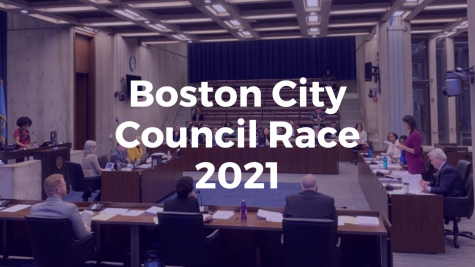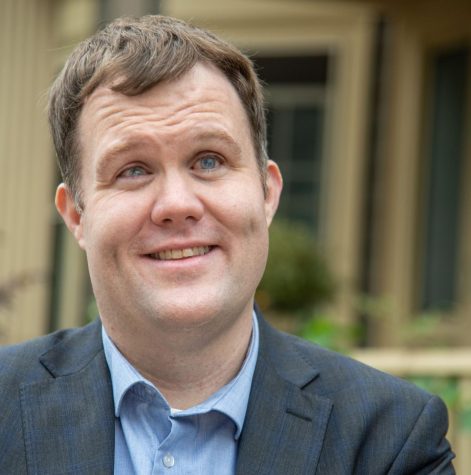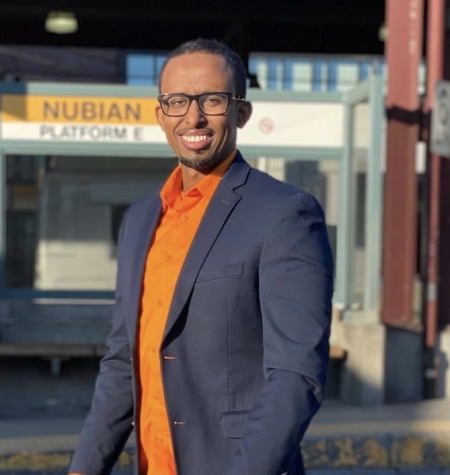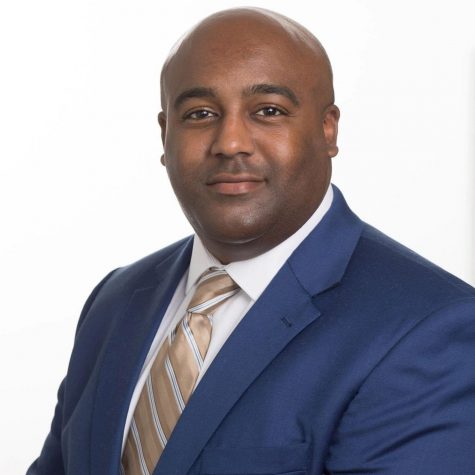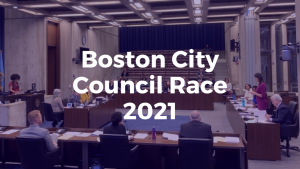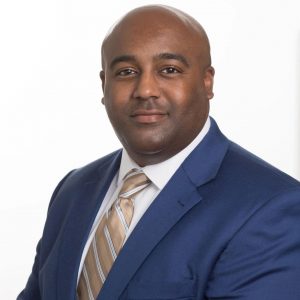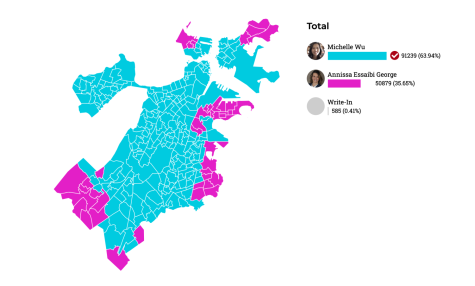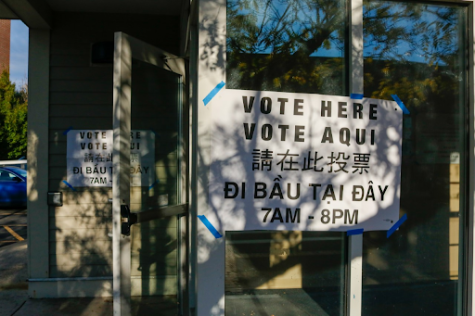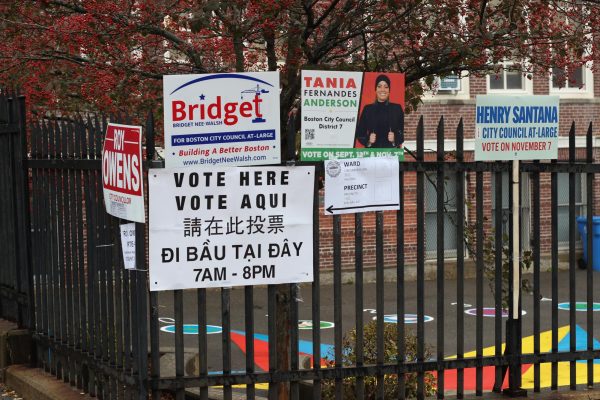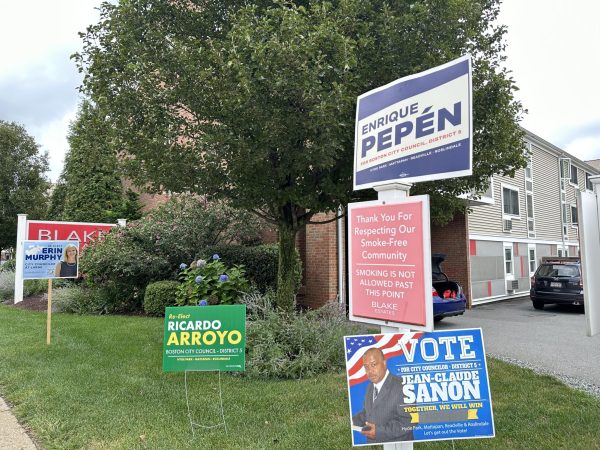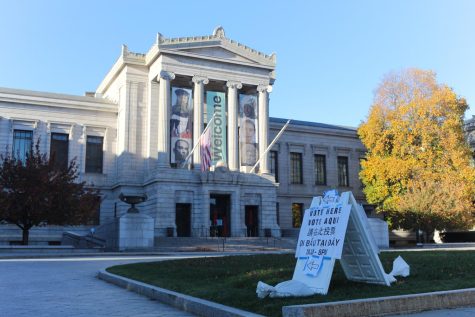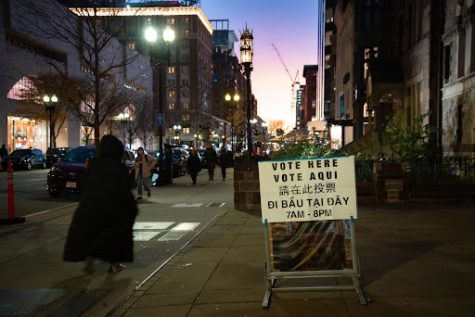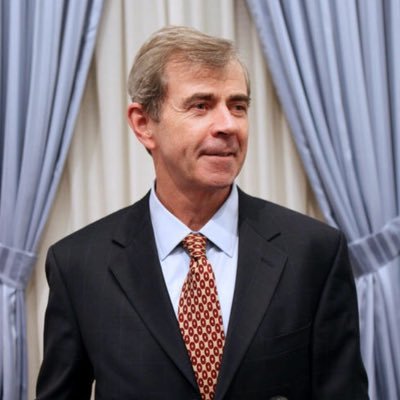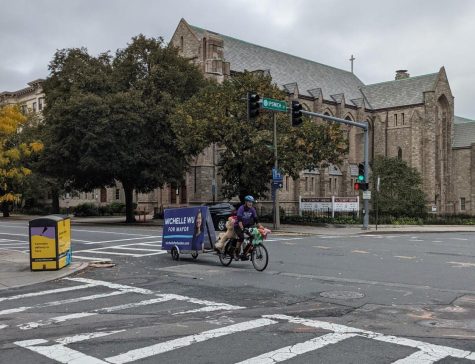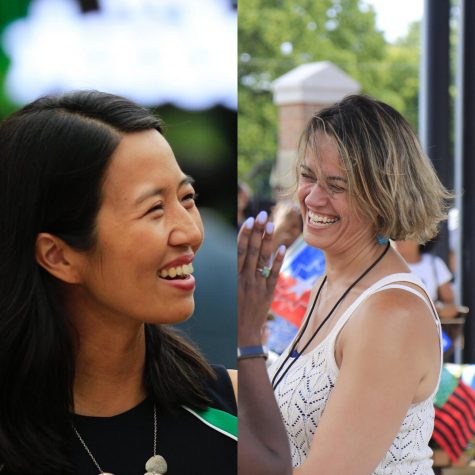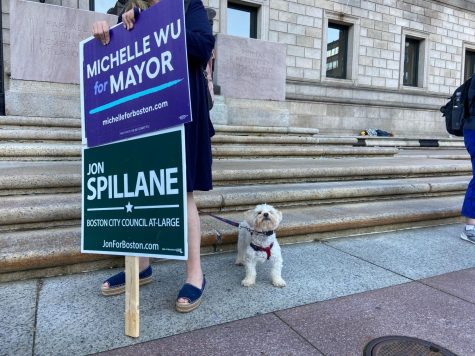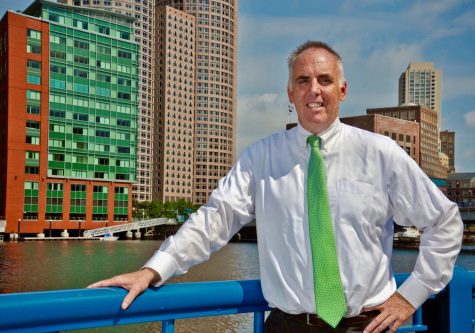City council race: Julia Mejia running for reelection for at-large seat
Incumbent Boston City Councilor At-Large, Julia Mejia, a community organizer who won her seat in 2019 by one vote after a recount, is running for re-election.
Mejia is running against at least 15 other candidates, including incumbent Michael Flaherty in the race for the at-large seat on the City Council. Councilors At-Large Michelle Wu and Annissa Essaibi-George are running for Boston mayor.
About six years ago, Mejia launched a volunteer-led group called Determined Divas. The group was set out to hold elected officials accountable, Mejia said. It was through this work that Mejia then came to know then city-councilor Ayanna Pressley. She noted how Pressley was the only elected official to routinely show up to their meetings, even when she was not invited to speak.
When Pressley decided to run for Congress and won, the next day, the Boston Herald interviewed Mejia on her thoughts of Pressley’s win, which wound up being Mejia’s announcement for office.
“When she won, I said if she could do it, I could, too,” Mejia told The Scope. “I’m going to run for office, and I’m going to be the first Latina to represent on the council.”
The single mother of one spent her childhood translating and helping her—at the time—undocumented mother who could not read or write. The family moved from the Dominican Republic to Dorchester when she was five years old. Mejia eventually dropped out of high school for a short time to assist her family and community, but later graduated from Dorchester High School and received her bachelor’s in communications from Mount Ida College.
The Scope spoke with Mejia to discuss her campaign’s top issues and her plans to address them if elected. The following conversation has been edited for length and clarity.
The last time when you ran for City Council, you won by one vote. Do you have a different campaign strategy this year?
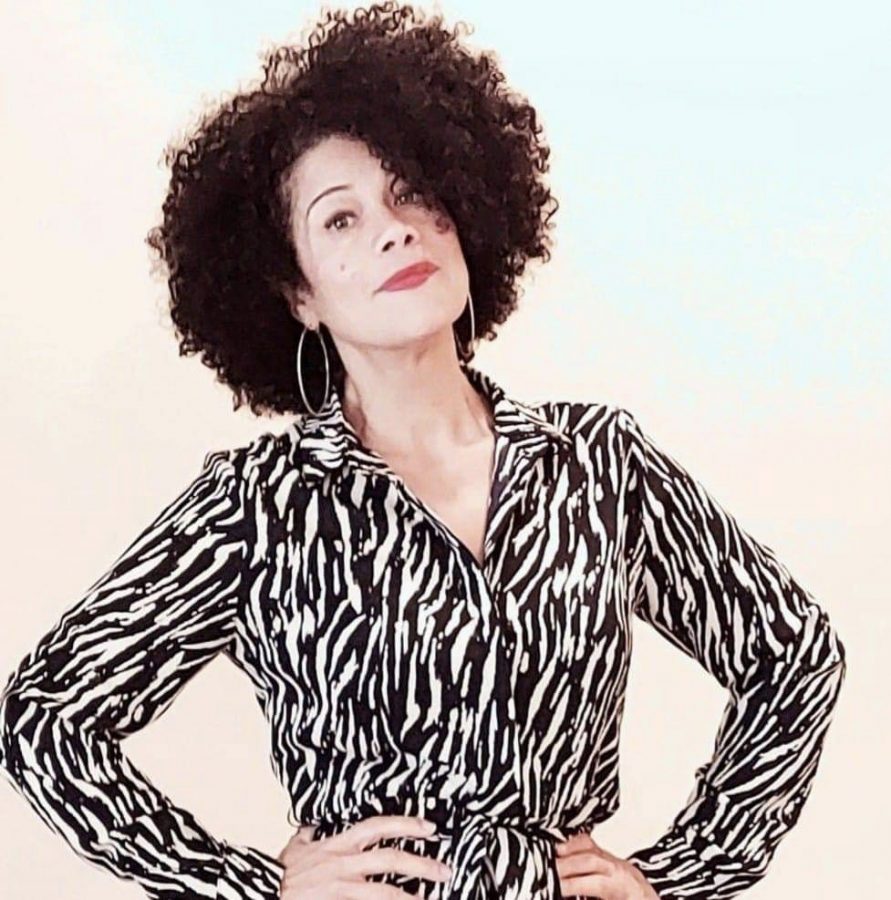
Well, so, we won by 22,492 votes. After the recount, the one vote was the deciding factor. But, you know, for me, it has never really been about… I’m not invested in changing anything that we’ve done because we want to continue to uplift the voices of the people who have been neglected. So, if anything, we’ve been more aggressive in including folks who haven’t been engaged. I’ve been utilizing my social media platforms to do these things called pop-ups. Where I literally just pop up on people and say, ‘What are you doing,’ ‘How are you living,’ ‘What’s going on in your hood,’ you know, really creating those organic opportunities for people to share their thoughts and experiences. Because of COVID, we’ve had to shift the level of engagement and how we do that. So, with social media, I’ve been using that platform for engagement to increase our exposure in those spaces, but doing so in a way that is creating a platform for people to share their own experiences and utilize our platform to uplift their own stories. Even our fundraising strategy is all about uplifting the people, so you would think as a candidate that every fundraiser would be all about who I am and what I’m doing, and why people should vote for me…we don’t take that route. We’ve done over the last few big fundraisers is [for example,] back in March, we profiled women, and we gave them five to seven minutes to talk about who they are, what they’re doing and how people can get engaged in their work. Uplifting the power of women; We did one around young people, uplifting the power of youth voice, entrepreneurs, innovators, social activists; creating a space for young people to showcase their work on our platform. It’s really sharing power, if you will. That is how we’re changing the scope of our work because of the virtual space we live in now and being really intentional about what it looks like when we uplift others. That’s part of our winning strategy for this time around.
We also have a new effort called ‘22 for 22’. So, because I’m always thinking about building the foundation because I’m a community organizer, for me, it’s really about building that power so that the work continues. Whether I’m in office or not, right. So, building the infrastructure across the city, having representation from all 22 neighborhoods. 22 people in 22 neighborhoods who are organizing around the issues impacting their lives, building that capacity, training them on how to organize, so that once we get back into offices, that’s my advisory committee, you know. These people will be the ones who are informing the decisions that we make and the policies that we pursue.
What would you say are the most important policies on your platform?
We do a lot around civic engagement and educating the public about their tax dollars and their role in all decision-making processes. For us, it is really building that infrastructure for real community voice. We’ve been able to do that in several different ways; We’ve hosted a lot of community conversations around COVID and the reopening of our schools. We created a whole community-centered approach to deal with the firework situation here in the city of Boston last year, where people wanted to take punitive measures against the people who were lighting the fireworks, and some folks didn’t want to do that. So, we convened over 450 people across the city of Boston to develop a community-centered approach to address this issue. So, all things that deal with community engagement and civic voice are a big part of our platform and continue to be a driving force for the way we work inside and outside of City Hall.
The other piece around the work is transparency. Because often, what we see is things are being done to us, without us. One part of it is engagement, but the other part of it is information justice, information sharing, and holding the city accountable to ensure that we have a dashboard set that a goal to identify how many contracts are being given to minority businesses, to talk about how many people are showing up to some of the housing meetings that are happening, when they’re trying to make a plan for a new project, right. So, really, that data holds the city accountable through a transparent lens, and so that not only are we sharing the information across platforms but that we’re doing our due diligence and making sure that that information gets shared in culturally competent ways. It’s interpretation and translation. And then, one of the biggest things that we’ve been fighting for is around literacy; there are a lot of folks who are struggling with reading and writing here in the city of Boston. The last time that there was a report that tracked the literacy rates in Boston was in 2003. That literacy component around transparency and information justice for us is really about three different audiences that we want to support. One is looking at that as a tool to dismantle the school-to-prison pipeline because there are a lot of young people who are reading at a third and fourth-grade level, who are in the 11th grade and about to graduate but still can’t read and write. And so, they’re showing up in classes, and their behavior, because they’re embarrassed or because they’re struggling, you know, they act up. Then they end up being expelled or suspended or end up in DYS, right, so there’s a correlation between the school-to-prison pipeline and literacy. We’re hoping that through that literacy task force that we’ve created, that we’ll be able to really tackle that issue.
The other piece of our literacy conversation that is tied to our information justice and transparency piece is that we have many returning citizens. These people are coming out of jail, who also struggled with reading and writing, and we expect people to fill out job applications but are struggling. If we’re really serious about recidivism then we need to look at literacy as a driving force around that issue. There are many immigrants who’ve had interrupted education… this all really stems from the fact that my mom didn’t make it beyond third grade. And so, I was able to drop out of high school, and every time my mom would get something in the mail, I would tell her what it said. And often, I read it to my benefit, so I was able to drop out. I was able to skip school because she couldn’t read or write, and even in her native language, she struggled with it. I signed everything for my mom, and because of my own lived experience, I know what a difference it is; if my mom were better at reading and writing, my trajectory would have probably been different. Yeah. So, that literacy piece is really important to us in our work. That’s information justice.
The other issues we are now diving deeper into are housing, planning and development issues. We hosted a hearing on impact advisory groups, and we’ve also hosted a housing summit. As a result of this work that we’ve been doing in community with folks living the realities, we’re creating a city-wide steering committee across the entire city of Boston to inform planning and development from a people-centered approach. Right now, the way housing is done is with developers in mind. And then they come into our neighborhoods, and they show us plans, and we react to those plans. We want to reverse it. We want to create a community-centered approach to planning and development, which the people lead. That is something that we have started this year. I hope to bring into my second term a community-centered approach to planning and development that residents are informed across the entire city of Boston. Often, what we have seen is that people work in silos. So, Allston and Brighton are talking about the issues that are impacting Allston and Brighton. East Boston is talking about the issues that are affecting them. For us, we want to break those silos. We want to bring people together across the entire city to all have the same conversation and create a standard, a bill of rights, if you will, for what housing, planning and development should look like moving forward. Not to replace the BPDA but to serve as a watchdog, if you will, for them.
And then the last piece of the work is education. You know, graduating, I was the first person in my family to graduate high school and college, and I was almost 20 by the time I did so, but I made it, and it was my ticket out of poverty. That is an issue that has always been near and dear to me, and that’s an issue that I hope if, given the opportunity to represent on the Council again, I’d like to be the chair of education. And the last piece of it is I’m the chair of small business and workforce development. So, continuing to help support entrepreneurs, small businesses and developing a more diverse workforce are the issues that I care about in that space. So, in a nutshell: education, housing, specifically around planning and development, government transparency and civic engagement.
There is quite a number of folks running for at-large. You’re an incumbent, along with Michael Flaherty. What would you say makes your campaign different from the many others that are running for at-large?
First of all, I would have to say I’m like a watered-down incumbent because we went through a traumatic one-vote victory, and we didn’t even get comfortable in our seats, and then COVID hit. We’ve been leading under a global pandemic and racial and civil unrest across the country. So, I haven’t had a traditional first time. I feel like I need a do-over. What makes our campaign uniquely different is just our commitment to centering the voices of the people. You know, I think that this is something that I always say is that when you grow up without a voice, and the minute that you have an opportunity to amplify, that’s all you ever want to do, and you want to create space for other people to do just that. And so, for us, that’s really always has been about bringing young people into these spaces; because the thing I do, whenever I enter a zoom or room, I look to see who’s not in there. Our campaign is really about being as inclusive as possible but being really unapologetic and intentional about BIPOC communities and people who have been shut out. That is a cornerstone. You know we’re intergenerational, and we’re diverse across socioeconomic status.
I was door-knocking in 2019 in Roslindale, and I was talking to a white family, and they talked about how they were concerned that their daughter now has to take public transportation, and they had some safety concerns. I said to them, ‘You know, there are families in Roxbury who have the same issues, but their concerns are around the violence.’ If we can all get together and tackle these issues, regardless of what your specific thread or lived experiences around this issue is; if we can see it as impacting us all, then that’s how we’re going to really move the needle around these issues. I think our ability to identify those opportunities and create an inclusive message around them is what I believe makes us unique.
I also think I’m the only Latina running on a city-wide platform. There are 130,000 Latino residents in the city of Boston. So, you know, I am an Afro-Latina; I claim my Black roots, but the reality is that I feel like I bring those two worlds together when it comes to Black and Latinx folks. I’m uniquely positioned to provide a microphone for these two communities that have been left out, and with 130,000 Latinos in the city of Boston and I’m the only one running at large. That will be a big void if I’m not there.
What is and what is not working in the city of Boston, and what do you think can be changed?
Everything. I think, you know, there is this tension in the city. I always say that we’re resource-rich but coordination poor. We have yet to be able to break down the silos. When I think about violence in Boston, everybody just talks about it from public safety. Right. I think about it through poverty. I think about how it shows up in our schools, what opportunities are missed in our health centers. There doesn’t seem to be a coordinated effort to tackle the social ills that we face. Things feel fragmented and disconnected. I feel like we need to be more intentional about a unified agenda. We have too many advocates working on different things, and I haven’t seen something that looks at the collective. I don’t think that the city government does a good job at really engaging their constituents in decision-making processes. We have public hearings, we have community conversations, you know, but not everybody has access to Zoom. So, what we have done in our office is we’ve taken these budget pop-up tours across the city of Boston. We took what we know into the streets, into barbershops, into events to educate people about their tax dollars, and got informed by them. I know the city adopted something where they were doing these dance pop-ups, but you didn’t really hear about them. And so, even though we’re a small office, we have a big reach, and the city could be doing a better job at being in non-traditional spaces instead of expecting people to come to them. The city needs to do a better job at meeting people where they’re at, and I think that’s why we spend so much time in hair salons and barbershops because you’re waiting to get your hair cut. I’m gonna have a captive audience, and I want to engage you in your own life, and I just don’t see that sense of urgency to really engage people.
Is there anything that you want to let our readers know or anything you want to say that I did not ask you?
One of the things that I encourage people to do is never leave themselves at the door to make other people feel comfortable. We’ve had this perception of what leadership looks like. Right. There was once upon a time that people were like, ‘Oh, we don’t want you to be the Cardi B of the campaign,’ you know, just because I’m a little bit rough around the edges. There’s this perceived perception that your pedigree and your degree dictates your electability. I refuse that motion to be the norm. As we look at the entire field, it’s really important for people to look at people’s skillsets and what everybody individually brings as a team to bring the work forward. Not everybody has to be super polished and ivy-leagued up.
You know, that everyday person like me… I’m a single mom, a grassroots organizer, grew up in the hood and dropped out of high school… those little things matter. They are a value because they inform the kind of questions that I ask in the hearing. They inform the type of programming that we pursue. And I say this because when COVID first came on to the scene, people were talking about flattening the curve and, you know, social distancing, I had to Google that. We don’t talk that way. Then, everybody talked about food access, and I was talking about, you know, let’s do this with dignity. We created the Bodega Project and partnered up with a nonprofit to raise money, and we gave people a $100 gift certificate to shop in their local bodega and do so with dignity. Instead of just getting a box of food, they were able to take that money. I grew up on welfare, and I know how embarrassing it was to go to the welfare office, to go to the store with your food stamps. Back then, it wasn’t a credit card. It was a food stamp that everybody knew that you had, that you were on food stamps because you couldn’t just swipe the card. So, that intentionality about creating a program that allowed people to shop with dignity is why representation in lived experience matters. So, if people weigh the candidates that will best represent the issues and their constituents, we cannot lose sight of those who might be a little bit rougher around the edge and who may not speak so eloquently. I may not be all of that, but all of who I am is enough. There’s a lot of unfinished business that we have. I just feel like a second term, you know, I have a growth mindset, and I believe that with a second term and everything that I’ve learned this year is really going to take the work to another level, and I want an opportunity to do so just that.
TRANSLATION
Español


